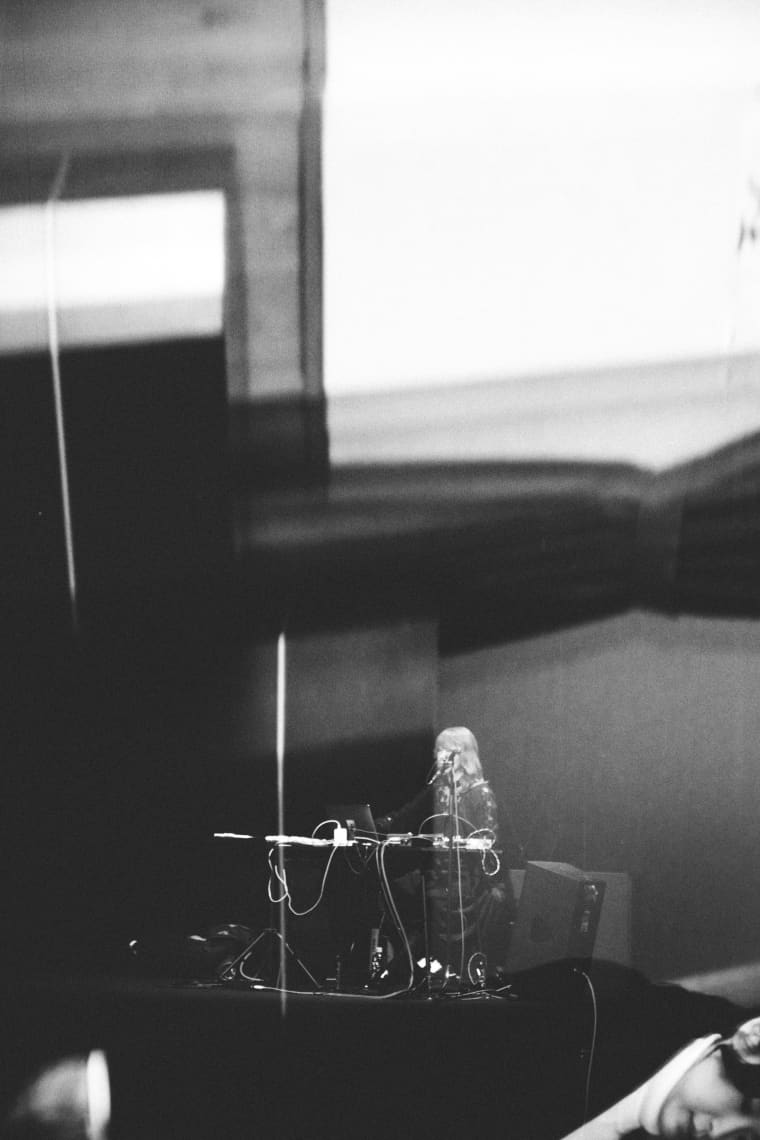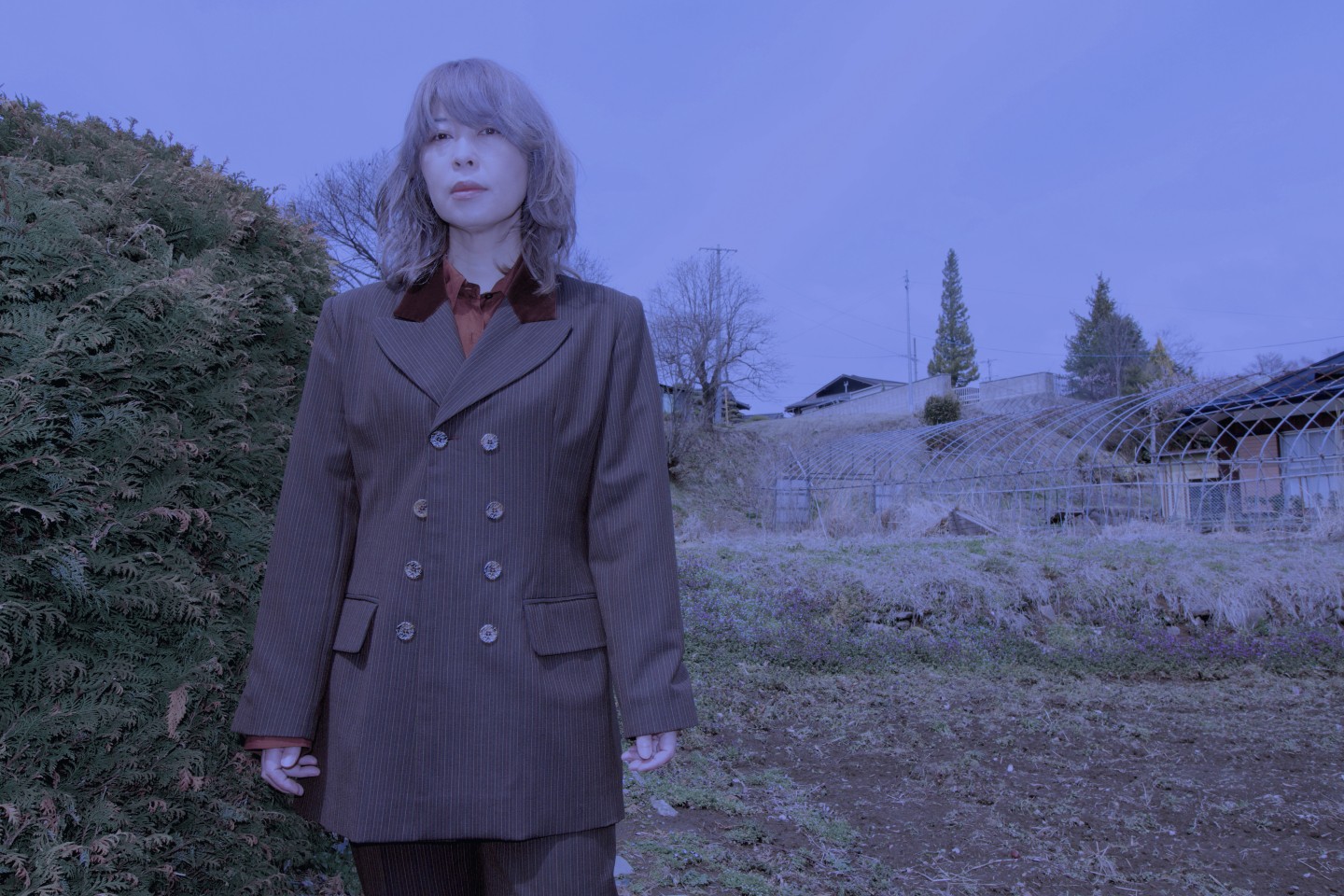Eiko Ishibashi. Photo by Jim O’Rourke.
We open on a long, steady tracking shot through the woods, the camera peering upward through a thin tree canopy into a bright winter sky. Gently swung cymbal triplets trickle up from the ground, followed by a pristine electric guitar from above, and symphonic strings that seep in through the sides and slowly saturate the mix. We follow the wandering lens and the hypnotic strings until they cut off abruptly, leaving us suspended in midair for a moment before we fall, quickly but not painfully, to the forest’s frozen floor.
The film is Evil Does Not Exist, renowned Japanese director Ryusuke Hamaguchi’s second feature scored by Eiko Ishibashi. Their first creative partnership, 2021’s Oscar-winning Drive My Car, was a relatively straightforward director-scorer affair, linked by a producer. But the working relationship that led to the new film was much more symbiotic. Watching and listening to its opening sequence out of context, it would be impossible to discern whether the music was made for the film or vice versa.
In fact, the film’s orchestral theme is the only part of its score that Ishibashi composed after viewing its first cut. It was recorded in her longtime partner Jim O’Rourke’s studio, which sits next to the house they share in the Japanese countryside. She recorded the rest of the music in her own studio (within the home itself), before looking at the script — some of it before Hamaguchi had even envisioned the footage he’d shot in her area as belonging to a full-length film.
Despite her impressive music catalog, Ishibashi has always been more fascinated by the world of film. Growing up in Chiba with parents who took her to war movies instead of the American coming-of-age flicks her peers were watching, she developed an early taste for difficult material, gravitating in her later teens toward the work of John Cassavetes.
Her earliest revelations in music started with tapes she made from the radio late at night, after her parents had gone to sleep. She’d bring these to her local rental shop to ask for song identifications and recommendations based on what she liked and, via this route, had her mind blown by Joni Mitchell’s Hejira and Miles Davis’s In a Silent Way, as well as Frank Zappa, Captain Beefheart, and Peter Gabriel-era Genesis.
Her first exercises in music making — attempts to score her own experimental, eight-millimeter shorts — also came from these radio taping sessions, during which she’d scan between channels and use the cassette recorder’s pause button as a cutting tool. To this day, post-production is the stage of the creative process she enjoys most. “Once I start editing my music, I’m able to treat it like it was made by somebody else,” she tells me in Japanese, with O’Rourke translating. “By editing and layering, I’m able to distance myself from it. It’s not really mine anymore; it’s just material to work with. It’s much more fulfilling to me that way.”
Evil Does Not Exist had its beginnings in Gift, an 80-minute silent film featuring untrained actors and long, idyllic shots of rural Japan. A film festival in Ghent, Belgium commissioned Ishibashi for a new musical work and asked her to choose a director to provide visual accompaniment for her performance. She chose Hamaguchi, who was so awed by the power of his ad hoc cast’s performances that he built the project into a feature.
The plot of Evil Does Not Exist follows Takumi (Hitoshi Omika), an absent-minded naturalist and jack of all trades who lives with his daughter Hana (Ryo Nishikawa) in the mountain village of Mizubiki. Their quiet life is disrupted by a Tokyo business’s aggressive pitch to build a glamping site nearby, a scheme that would have devastating effects on the surrounding environment. It’s a fictionalization of a true story that’s still developing in Eiko’s area.
Hamaguchi’s frustration and anger with the situation remains mostly bottled until the film’s intense climax, a wordless sequence set to 12 minutes of Ishibashi’s mixed electronic/orchestral score. As the action falls, her string theme returns, and the camera points up to the night sky, resuming its slow, tracking journey through the woods.
The Venice International Film Festival hosted the premiere of Evil Does Not Exist in early September 2023, a month before Gift had its own premiere at Film Fest Gent. Both films have slowly toured the world since, sometimes in tandem, with Ishibashi sitting in to perform Gift’s live score. Today, her original soundtrack for the narrative feature arrives in album form. Weeks before its release, I spoke to Eiko from across the world.
NOTE: Throughout our interview, Jim acted as our interpreter. When translating Eiko’s answers to me, he mainly used the third person. We’ve edited these translations into the first person for clarity’s sake, and quoted Jim only in the instances where he made clear he was speaking as himself.
Growing up on your parents’ favorite war films, did you ever feel like you were missing out on the kids’ movies your friends were watching?
EI: Maybe as a child I wanted to see the animated films my friends were talking about. But I’m grateful I was exposed to things my friends weren’t being exposed to, like war movies and The Shining. It led me down a different path in life.
The animated films when I was a kid weren’t as brainwashing as they are now; at that time, the brainwashing came from the Spielbergian kid-goes-on-an-adventure movies, but I didn’t get to see those either. Instead, I was watching Jack Torrance and the Elephant Man.
Wow. Did you enjoy those movies at the time?
EI: [Laughs] When movies came out in Japan back then, it was very common for movie theaters to sell little pamphlets about them. My mother bought me the pamphlets for The Elephant Man and Apocalypse Now. I thought they were scary, so I hid them in the closet.
What did you mean when you said anime was less brainwashing back then than it is now?
[Jim and Eiko discuss the question in Japanese.]
Jim O’Rourke: This is me talking now, but Eiko agrees: There’s a concept in Japan called “shiawaze” that basically means “happiness,” but happiness through the act of giving up your individuality for the greater good. It’s brainwashing in the sense that happiness is more important than anything, regardless of whether that happiness is a hollow, meaningless state or not. Every country has its own way of brainwashing the public to make them malleable, and in Japan, it’s manifested as this very specific sort of infantilization. The government talks to people, [directly and] through art forms, as if they’re children who have to be guided by the hand.
EI: When I was a kid, anime was much more tied to history, but now it’s detached from that and almost a direct appeal to the audience’s child brain.
“Instead of discussing the script, Hamaguchi and I were having email conversations about how fucked up things were in real life in Japan during COVID… I never saw the actual script.”
I know the broad strokes of you and Hamaguchi’s journey from Drive My Car to Gift to Evil Does Not Exist, but I’d love to get more emotional context for the turns you took on the way.
EI: After Drive My Car, Hamaguchi’s life got taken over with award shows and hundreds of interviews. None of this had ever happened to him before, and all of a sudden there were offers to do…
JO: Maybe a Marvel movie [laughs]. I’m not saying that happened, but it was that kind of situation.
EI: He was worried he’d never get the opportunity to make something he wanted to make again. [In making Gift], he saw an opportunity to do something experimental before that world might possibly overtake his life.
Did you get caught up in that whirlwind of success at all?
EI: It wasn’t too much of an overload. While Hamaguchi was going to all the festivals, I was here in the mountains, making other things.
Has anyone approached you to score a Marvel movie yet?
EI: No offers for anything.
JO: That’s one of the great myths: that if you do something everyone likes, you get offers.

Photos by Shuhei Kojima.

How did your process change as the music went from center stage in Gift to a more conventional, accompanying role in Evil Does Not Exist?
EI: The film has an anger to it that the music didn’t, so the shading and counterpoint it needed changed. I wrote the string theme to address that anger.
Hamaguchi was really interested in this German documentary called Dust. He sent a DVD of it to us and said that was the approach he wanted to go for. The demos I made at that time, before he had shot anything, were of the electronic music that’s in Evil Does Not Exist: piano, filters, and a very old Nord keyboard, the original Nord modular from the ’90s.
The first of those pieces, “Hana,” comes right after the opening string theme. It’s interesting to me that Hana’s journey through the woods was inspired by those searching keyboard modulations, not the other way around. I was gonna ask if the song was what you imagined was going through Hana’s head on that walk, but clearly not.
EI: Right. There was no Hana yet [laughs]. But no, I don’t think the music had so much of an influence on the script. The biggest influence was a tape of the actual meeting of people coming to convince the people out here to let them make a glamping site. A meeting like the one in the film actually happened, and someone we know taped it and gave it to Hamaguchi. Once he heard that, he rushed back to Tokyo and started writing a script.
How close to verbatim was the scene in the movie to that tape?
EI: Neither of us ever heard that cassette, so we don’t know, but we knew about the situation. It’s an ongoing thing: Before the bubble — the big economic boom in the ’80s — this area was built up as a resort area, and a lot of well-off people built summer houses out here. But then the bubble burst, and all of that was abandoned.
It’s an area filled with summer houses and resorts built in the ’80s that are almost 90% empty. After years of it being reclaimed by farmers and becoming quiet, it’s like a movie set for a movie that isn’t being made.
JO: It’s like if a studio still had a lot for Westerns, but no one’s making Westerns anymore.
EI: With COVID, which is very important to the movie, the Japanese government had all these plans to give people money for reconstruction, but a lot of businesses took advantage of these things and made a lot of bullshit ideas to get government money. Glamping is one of the things a lot of those companies did. They were taking advantage of people in the countryside, saying, “It’ll be great for you,” and it was just a bunch of bullshit.
“Relying on translation of creates a distance. But, of course, there are all the other elements — the image, the sound — that can be relied upon to get closer to what actually happened than you would by listening to the lines.”
It’s not just electronic vs. strings — there are lots of stylistic jumps in the score: There’s the ambient track “Fether”; there’s “Smoke,” which feels almost like ’70s fusion. Did you and Hamaguchi have discussions about these pivots during the making of Gift and Evil Does Not Exist?
EI: Not at all. There was almost no discussion about what direction Hamaguchi wanted to go with the music, unlike with Drive My Car. With this film, it was almost like we were working on two separate train tracks simultaneously. He let me go with the music, but he was very specific about how he used it — where he placed it and how he edited it. He was treating the music like another character in the film, rather than something separate from the film that was commenting on it.
I didn’t know anything about the plot of the film before I watched it. Instead of discussing the script, Hamaguchi and I were having email conversations about how fucked up things were in real life in Japan during COVID, like, “This is bullshit.” I never saw the actual script.
Beyond circumstance, how did you decide to create such a shifting, piecemeal score, rather than taking a more conventional, “symphonic” approach?
EI: Well it’s not uncommon, when you’re scoring a film, to be asked to make music in different genres. You go from making music for the film to making music that’s in the film. I was relieved that with this one — even though it was made piecemeal — there was no requirement for that. It’s all music that, in a way, is outside the film.
Hamaguchi and I talked a lot about how Godard treats music just as material, whether it’s diegetic or outside the film. There was initially an agreement that the music would be treated that way — that it didn’t necessarily have a non-diegetic role in the film; it could be treated in many different ways.
Hamaguchi’s films — Drive My Car, in particular — are full of long, fluid tracking shots, and your music mirrors them in a really interesting way. Is that intentional?
EI: In Drive My Car, the driver character is a very good driver. The funny thing is that the drummer I worked with, Tatsuhisa, is also a very good driver. I wanted to get the sense across of a steady, comfortable, reliable rhythm. The audience can’t experience that comfortable driving, so I wanted to express that through the music.
The opening and closing string themes of Evil Does Not Exist, which are nearly identical but occur in very different contexts, are also accompanied by long tracking shots of the sky through the trees — first in the day, then at night. When you recorded that theme, did you immediately know it would fit the opening and closing moments of the film?
EI: I’d seen the first cut of the film by that time, and even though it was Hamaguchi who would eventually decide where it would go, I made the string theme for that image. Hamaguchi felt that as well.

Photo by Jim O’Rourke.
When I’m watching a film in a language I don’t understand, I end up wondering what details I missed by focusing on the subtitles. As a lover of foreign films — and as someone who’s been so intimately involved in the production of films — how does having to read translations of the dialogue affect your moviegoing experience?
EI: Relying on translation of creates a distance. But, of course, there are all the other elements — the image, the sound — that can be relied upon to get closer to what actually happened than you would by listening to the lines.
Before we go, are you willing to share your take on the ending of Evil Does Not Exist? I’ll avoid giving The FADER’s readership any spoilers.
EI: [Laughs] Hamaguchi has been asked a lot about that last scene, and I really like his answer: “Once you’ve watched it three times, you’ll understand.”





